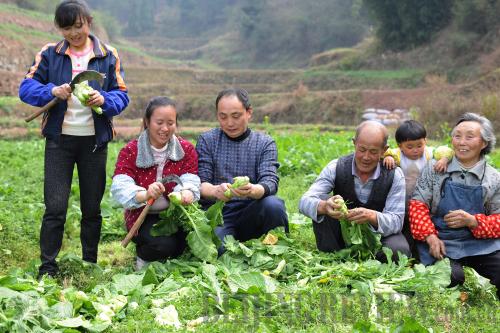|
 |
|
HOUSEHOLD OPERATION: Zhang Zecheng (third left), a family farm operator in southwest China's Chongqing Municipality, collects vegetables with his family on March 7 (LI JIAN) |
In March 2012, Zhang Zecheng and his wife made up their minds to return to their roots by becoming vegetable farmers in Liangshui Village in southwest China's Chongqing Municipality.
Before the career switch, they had left their underdeveloped hometown on the outskirts of Chongqing in search of better wages as migrant workers in Guangdong Province and worked for years.
Along with his wife and four other family members, Zhang contracted 1.3 hectares of land in the village to grow organic vegetables for urban consumers, earning more than 10,000 yuan ($1,618) each month. He has bought two cultivators and a truck to expand production.
Zhang's business got a new boost when the Chinese Government issued its first policy document of the year on January 31, which customarily deals with agricultural policy, announcing it would encourage the establishment of bigger specialized farming units and grant more subsidies to large-scale landholders, family farms and rural cooperatives. Meeting local registration requirements, Zhang officially registered his operation as a family farm on February 21.
"The recognition by authorities gives family farms the legal status to attract enough resources like personnel and funds for their further development," said Liu Yonghao, Chairman of the New Hope Group, one of China's largest agribusinesses based in Sichuan Province.
"Since family farms are the basic units to supply agricultural products, if their number and scale can enlarge, then China's current agricultural situation might be alleviated," Liu said. Urbanization is causing labor shortages in rural China.
A new trend
The concept of a "family farm" is not new in China.
For more than three years, a little-known pilot scheme has allowed qualified rural families to sign contracts with village authorities to rent management rights to large areas of arable land from other families.
Currently, more than 6,670 family farms are operating in 33 land-transfer trial programs approved by the Ministry of Agriculture (MOA), according to the Xinhua News Agency.
However, the scheme has been restrained by the household contract responsibility system introduced in the process of China's reform and opening up 30 years ago, which then enabled farmers to use land through long-term contracts and keep their produce after paying taxes.
Under the system, farmers were confined to a small patch of land in the 1980s and 1990s, when land transfers were forbidden. The fragmentation of farmland made the use of large machinery problematic. According to the MOA, more than 80 percent of China's farmland is operated in a decentralized fashion.
| 